Home > Articles > The Archives > Don Reno, Red Smiley, Bill Harrell and the Tennessee Cut-ups
Don Reno, Red Smiley, Bill Harrell and the Tennessee Cut-ups
Reprinted from Bluegrass Unlimited Magazine
June, 1971 — Volume 5, Number 12
Red Smiley
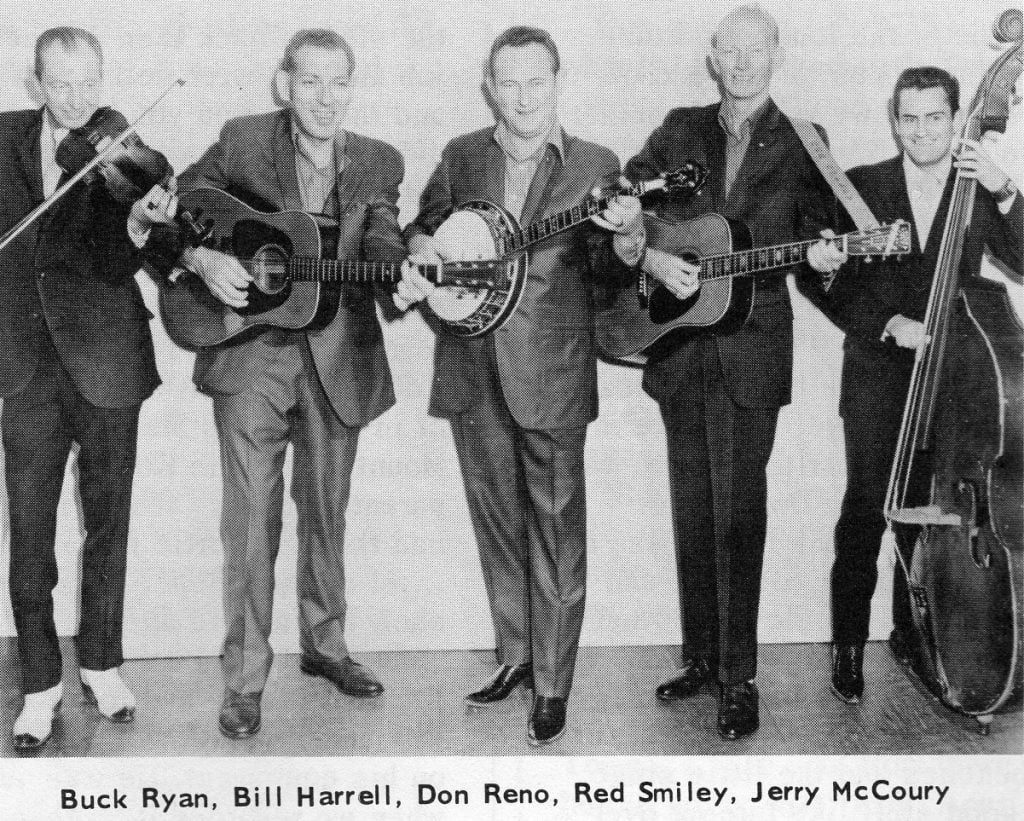
Red has been in semi-retirement for almost three years now and is working at a few of the major festivals and shows this past year. However, he is working now with Don Reno, his old partner and Bill Harrell, who has been Don’s partner for a number of years. Red was quite excited about playing again. “Well as long as the health holds up, I will be playing regular with Don & Bill. I won’t be playing anything but with them.’’ When asked about his recording plans we learned that he, Don and Bill have not been wasting any time. “Yes, we have an album recorded which will be released around the end of May. That’s on the Rome label. The same one we have our single on out of Columbus, Ohio. Don, Bill and I are all on the album. It’s a mixture of gospel, instrumentals and ballads. About the same thing we have been doing through the years. Actually, my doctor asked me to take it easy from music.” (Red has diabetes) “For about a year and a half I didn’t pick any but at home. We would have an oyster roast, or a crab feast on a Saturday night down at my home and we’d invite some close friends like Nelson (Waibel) down and we’d have a jam session in the living room. Of course, it’s in your blood and Don and Bill were nice enough to ask me if I’d work some with them. We started working together last year at some of the festivals but since then I’ve been working most all of the shows they have. A lot of the shows have been booked on the strength of Don and I being back together.”
Red worked before his semi-retirement on the television show that he and Don started in Roanoke, Virginia. After he and Don parted ways he preferred to stay in the area rather than travel as Don wanted to do.
“I worked the show until late March of 1968; which by myself and with Don, was a fourteen year stand. They sold the station (WDBJ) and as it is when they sell a station there is a turnover in personnel and they discontinued the show. I had been told by my doctor before then to cut down on it and I had cut down a lot from so much traveling. I saw a chance then to get out of it completely and to get some rest.” Don and Red, and later Red with his own group had the early morning TV show from WDBJ. “We had the first early morning show in the history of television. Don and I had first started to work for WDBJ radio in 1949. We were asked in 1956 to come to Roanoke and do a television show at night. We did the show for about two or three months (at night) and then they came to us with the idea of an early morning television show. At the time I thought it was ridiculous. We had just remarked that we had finally got out of early morning radio after those many years and here we were throwing ourselves back again getting up at four to be ready for a six o’clock television show.
I worked it for a total of fourteen years. The last four were without Don. The show was five days a week every morning and we also had a show for seven years over WSVA in Harrisonburg, Virginia along with all the road work and shows that we did. Most all of the shows were done live.” Television played a major part in the existence of Don and Red over the years. ‘‘Yes, it enabled us to pay a band a decent wage and keep them together and if Don and I made any excess other than a little living we had to get out on the road and get it. We traveled many a mile.
Red and Don Reno had had one of the longest partnerships in the music business going. “Yes, at the end of this year counting the five years that we weren’t together it would have been twenty-two years. We worked together solid for about fifteen years. “We were limited (in area) by the restriction of the TV show and Don wanted to expand a bit more and I didn’t feel I was able to do it. Don and I never were enemies. With all honesty, Don and I never had a cross word.
In 1965 the first bluegrass festival was held in Fincastle, Virginia near Red’s home base of Roanoke. “We were involved in the very first one along with Carlton Haney, who was my manager at the time and had been Don and my manager for many years. One of the reasons that it was held there was we had the outlet for television coverage and we had a lot of followers in that area, and people knew where we were. Of course, Carlton was there and we were there most of the time and to help out where we could. John Palmer and Mac McGaha, who were working with us at the time, helped build what few benches and the little stage that were there. And all that good stuff like turning over rocks and raking leaves and things like that”. Red had no idea that the festivals would grow like they have. “Well, I never knew they would get as national as they did. I’m glad but I didn’t realize that they would put as many acts together in a two or three day period as they have.” The festivals are nice to many people like Red who is restricted in his traveling. “Yes it’s nice to not have to play one night and then get out and drive 700-1,000 miles to get to the next days work. I also enjoy being able to meet the people and spend more time with them. The traveling is easier now. We used to all go in cars then. They didn’t have buses or camper type vehicles available like they do now. Twelve or fifteen hundred miles in a car didn’t mean nothing to me then. It didn’t make any difference. In fact, if I didn’t have six or seven hundred miles to go I didn’t think I was going anywhere.”
“The Roanoke area is the finest, in my opinion, bluegrass areas in the United States.” WDBJ covered into North Carolina, Virginia, Tennessee and West Virginia and there were lots of bookings for the bands that worked there. “Even to the president of the company at the station back then respected you. He was doing his job and you were doing yours and making money for him and they treated you good. A lot of the other stations didn’t do it that way and the acts would move on. It was that way the whole time that we were there. We were sponsored by Dr. Pepper back in radio in 1949 and when we went in with the TV show, Dr. Pepper was the first to snap up time on that program. They stayed with us for fourteen years. Five years of that Dr. Pepper outsold Coca-cola in that area and that’s the only place I know of in the United States that’s happened. We started Mountain Dew in Roanoke, Va. Dr. Pepper was the parent company (at that time) for Mountain Dew and we had the first bottle in the east down in Roanoke, Virginia of course, Pepsi-Cola is distributing it now but our show had a lot to do with its start in the east.
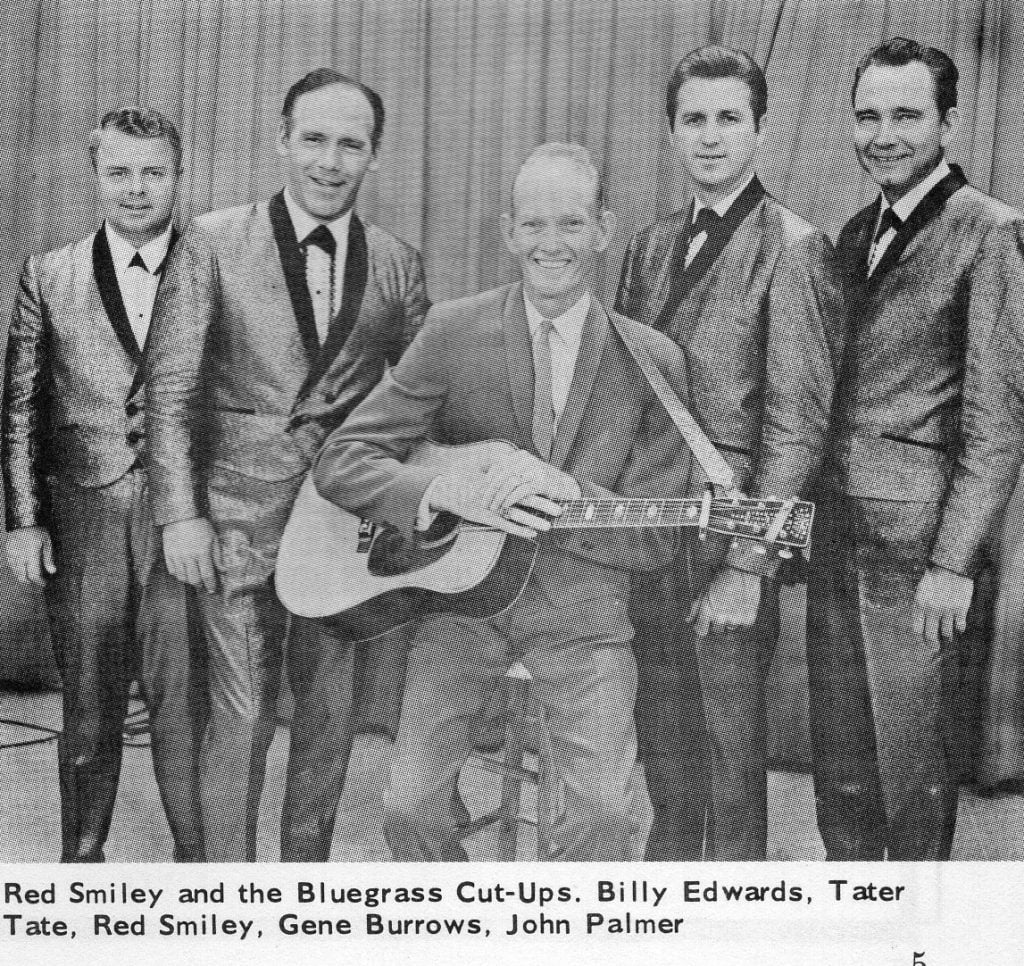
Red with his own group cut one LP on Rimrock (Wayne Raney’s label), and four for Uncle Jim O’Neal on Rural Rhythm. “Our album was the first one that Wayne pressed on his equipment. He was just installing the presses when we recorded it.’’ When Don and Red were recording with King they recorded an amazing number of sides and many were cut at the same time. “Yes they used to record quite a few it seemed that we may have recorded up to forty at one time. Sid Nathan (President of King records, now deceased) was good to us. We might have disagreed but we told each other about it and we got along. Sid had his own studios and we could have all the time we wanted but Don and I were pressed for time and when King wanted recordings we had trouble finding the time. We also used the studios in Charlotte, N.C. a couple of times. We also used our own studios in Roanoke for a couple of songs.”
Don and Red worked on the Old Dominion Barn Dance in Richmond, Virginia for quite a few years. This was broadcast over WRVA another of the 50,000 watt radio giants that had a large effect on the music. “There were a lot of people who worked at the Barn Dance then other than ourselves like Mac Wiseman, Lester Flatt and Earl Scruggs, Charlie Bailey, and Curly Howard and the Farm Hands with Allen Shelton.”
Don and Red also leased the barn dance show when the radio station took it off the air and it was renamed the New Dominion Barn Dance. “Well, we were the ramrods for it but when it went off the air that was what kind of killed it. With the radio a lot of people would come and hope to hear their name mentioned and that would always get a good crowd. Buck Ryan who is with Don and Bill now worked with Sunshine Sue (Workman) at the Old Dominion Barn Dance.’’ The radio coverage again enabled them to work in a lot of areas that had not seen much bluegrass talent or Grand Ole Opry acts either. “Don and I were some of the first groups that worked a lot of the eastern seaboard at that time. I remember going into Newark, New Jersey with Ray Price to work a show. I was afraid to go into the town much less get on the same show with (Ray) Price. They had given us twenty minutes and we got off the stage we had been on almost 65.
Don and Red left WDBJ to go Wheeling, West Virginia where they worked with Toby Stroud for two years before coming to Richmond and the Old Dominion Barn Dance. They started working in Roanoke with Tommy Magness Magness in 1949. Between 1952 and 1955 they only recorded together and Red worked for the state of North Carolina, his home state being from Asheville, N.C. while Don Reno went to work with Arthur (Guitar Boogie) Smith in Charlotte, North Carolina. “Yes we left Wheeling and went to Spartenburg, South Carolina and starved to death for a couple of years.’’ Red had met Tommy Magness while he was attending diesel mechanic’s school in Nashville, Tennessee. Red had not let his music stand idle and worked while in Nashville with Big Jeff and the Radio Playboys. Tommy had just left Roy Acuff at the time and Red and Tommy lived in the same trailer park in Nashville. “I had been in auto diesel college using some of what Uncle had given me in the GI bill. I went back home (to Asheville) and Tommy called me from Roanoke. Tommy’s wife was from there and Tommy had worked there before going with (Roy) Acuff. Tommy called me and asked if I wanted to go to work with him and he asked if I knew where I could get a banjo picker. Well I said, “Don Reno’s down here in Spartenburg, South Carolina and he has got a little band on the radio station down there. I’ll call him.” I told Tommy I would leave in the morning. Gladys (Red’s wife) and I were footloose and fancy free and we didn’t have anything to lose so we hooked up our house trailer and left for Roanoke. Don called me about two days later saying he would be there to work with us. “At the time the band was Tommy Magness, Don Reno, Red Smiley and Verlon Reno (Don’s nephew). They were playing bluegrass though it hadn’t been defined at the time. “We knew we were playing something different but it was the kind of music I had been raised up with.
Wiley and Zeke Morris were from my home town down there in North Carolina and Wade Mainer, and Bill and Charlie Monroe had played the radio station in Asheville (N.C.) and Spartenburg (S.C.). That was the kind of music they all played mandolin and guitar, and fiddles and all. Of course, Hoke Jenkins played a two-finger banjo very close to the three-finger style then and Snuffy Jenkins whom we all know. We recorded four gospel songs with Tommy on the Federal label (an affiliate of King). That’s how come we got the contract with King later. We went up to record and we had these four gospel songs and Sid Nathan wanted them. We had Don and I and Jackie Phelps and Remus Bell (sic) singing the quartets and Sid (Nathan) said, “Tommy what can you do?”. Tommy had the contract you know and Tommy said, “I want to sing” and Sid said, “No, no I want these boys to sing, you play the bass.” The four sides were recorded with Don Reno, Red Smiley, Jackie Phelps, Remus Bell and Tommy Magness on bass fiddle. Remus normally played bass with the group and Tommy was the fiddler. Tommy Magness worked with Bill Monroe as a member of the Blue Grass Boys during the early 1940’s, fiddled as the original cut of the Mule Skinner Blues. They worked with Tommy Magness for a little over two years.
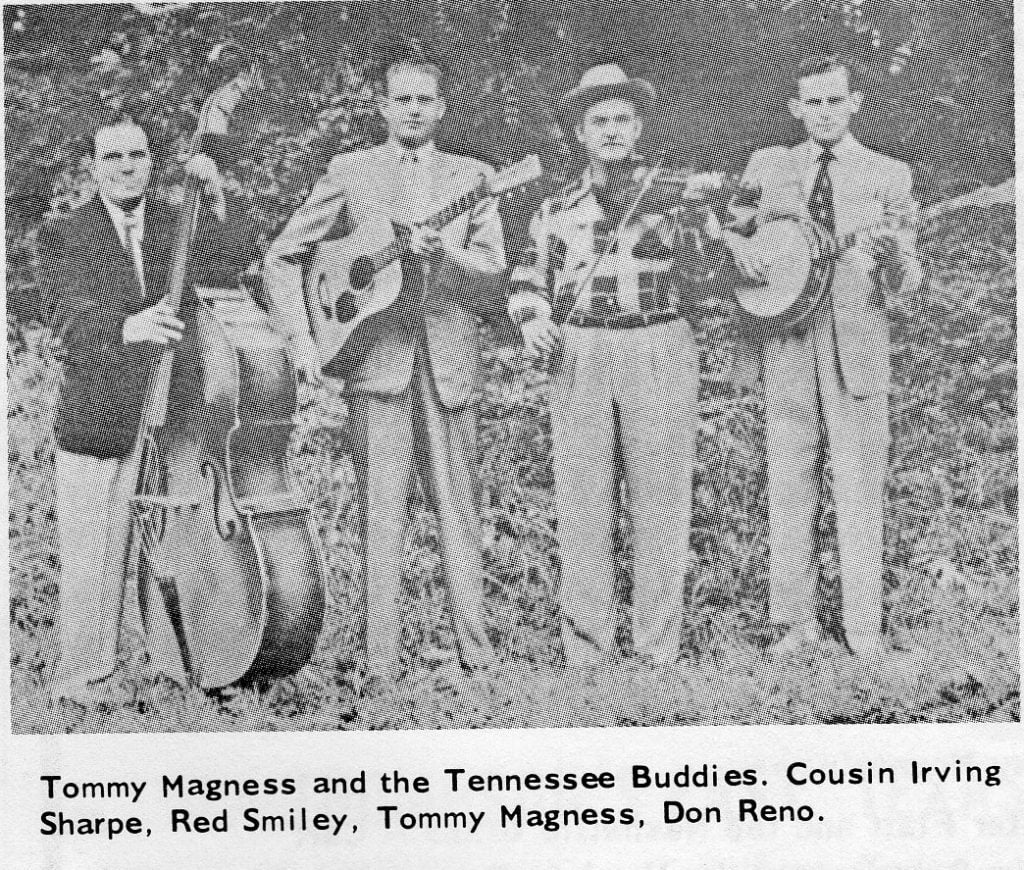
Red has very strong thoughts about bluegrass music. “Its not the easiest to play by a long ways. I think that straight country style is a lot easier to learn. There is a different timing and feeling to bluegrass. I’ve had people come up to me and ask, ‘Where do you put this run in at?’ and I just tell them I put it where I feel it.” Red has made the “D” run more popular than any other guitarist and we asked where he got it from. “I’ll have to give a lot of credit to Wiley Morris. Now he didn’t use it exactly the way that I use it but he used it in ‘F’ and I just moved it from F to D. Wiley always sang in F and he was one of the finest there ever was. You could put Wiley in here and sing Frank Sinatra songs and Wiley would sing Frank Sinatra. Or you could put Bill Monroe in here and Wiley in there and Wiley could sing Bill Monroe songs and he was a terrific guitar man. Wiley and Zeke Morris were from Ashville and played what we called “Front Porch Music”. Where you could lean back and just sing as loud or as long as you wanted to and nobody bothered you. It was a close kin to what they’re calling bluegrass now”.
Red worked with Wiley and Zeke Morris for a while in his early days. “In 1948 Zeke Morris, Red Rector, Fred Smith, Howard Thompson and myself worked for a radio station in Johnson City, Tennessee on WJHL. I had the car and the PA set and I begged Red Rector and Fred Smith’s mothers to let them go with me, they were teenagers then, and we worked there for about eight months. Zeke was the only one married then and he was always wanting to go back home. Every time we’d find the car gone we’d call home and there would be Zeke and my car. Wiley (Morris) wanted to go to New York and record and he called Zeke at the rooming house where we were all living at in Johnson City and Zeke said, “You’ll have to come up here to practice”. Wiley came up and they practiced for that recording there in the next bedroom. I had an F-5 mandolin which I bought in Newport News, Va. in 1939 before I went in the Army and I just gave it away. Zeke used that mandolin and Wiley used my old D-18 guitar to practice before they went up to New York and recorded. At that time recordings were just almost unheard of. That was something that seemed the end of the rainbow for us.
Red carried an eight-piece band to Newport, Kentucky to work in a gambling hall, legal then in 1946. “It was a good paying job but we went to work at 10:30 at night and got done at 4:30 in the morning.” Was bluegrass a style even to an eight-piece band complete with an accordian (required by the club management)? “Oh yes, we knew it was a different thing, I had guitar men who could play either one and a fiddler who could do either and the bass player was the same way. When someone would come up and ask for Blue Moon of Kentucky four of my musicians would just sit out completely. They knew they couldn’t do it and they weren’t supposed to be in it and they just set out. We were doing requests and we were doing everybody’s style. I was singing Hank Thompson and Ernest Tubb along with Bill Monroe.
Two other brothers were ones who got Red interested in music. “They were hoboes. Their names were Turner and they never did record or anything like that. We were living in Bushville, North Carolina at the time. It’s covered up by the TVA lake now. My daddy was a school teacher and we had a house by the railroad tracks that we rented. I was about seven years old at the time and had been trying to play a guitar cause my sisters and brother played. I was out at the old pump and I heard some music coming out of a boxcar. I threw down the bucket and water and ran up to where the music was coming from and here were these two guys who were just singing and picking their hearts out. I had heard the Delmore Brothers and the Carter Family too and always listened to XERF, in Del Rio, Texas. Those hoboes really got my interest up about playing music and I haven’t really ever wanted to do anything else.”
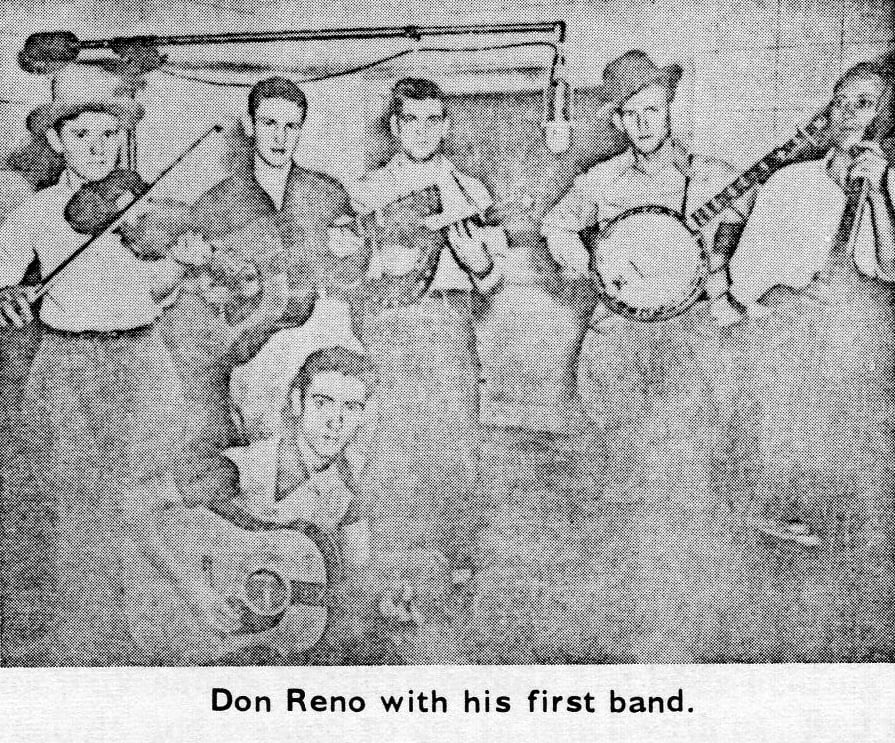
Don Reno Interview
(May 12, 1971) Riverdale, Maryland
When did you start out, Don? When did you get the bug?
I started playing music when I was between five and six years old and in business professionally when I was 12. The first professional job I did was an early morning radio show at WSPA Spartanburg, S. C. at 6 until 7 o’clock just by myself with guitar and harmonica. I didn’t know I was on radio ’til about two weeks later. I went home and people told me. Then there was a group from over at Greer, S.C. Tapp brothers and the Ponders. They had a little group and all of them played guitar.
They come over and wanted to start playing on the radio show with me so I figured there were too many guitars in the bunch so I started playing banjo. I played banjo. I’d played banjo before, but right at that particular time I was using guitar and harmonica.
It was easier to pick a guitar than play banjo?
That’s right.
When was this?
Some where around 19 and 40 or 41 I figure, I was 12 years old at the time.
When you learned to play banjo, did you hear Snuffy Jenkins on radio out of Columbia, S. C.?
I used to listen to him every day and they had quite a tremendous group together at the time. The first I heard of him was he was playing with J. E. Mainer’s Mountaineers.
Snuffy was?
Yes. J. E., Snuffy, and Henson Stokes, Leonard Stokes and George Morris. They went by the name of Henson and Sambo. They had a terrific duet and Byron Parker, the old hired hand got in the picture somewhere I guess the latter part of ’38. JE left the group and Byron took over and called, (it was sponsored by Black Draught) and they called it the Blackdraught Hillbillys and Homer Sherrill, Pappy Sherrill took JE’s place.
Were you playing the three-finger style, is that what you played?
Not before I heard Snuffy.
You had been playing the banjo though?
I’d played a little two-finger style, but I didn’t like what I was hearing. When I heard Snuffy, I said now this is something.
Did you know that it was different?
Yes, sure. Most of the people who played two-finger were trying to copy the three-finger with the two-finger and many times it came out almost like that. When you had that third finger in there you had such a deeper scope. Snuffy was doing things that couldn’t be done with two fingers.
Did you see Snuffy, did you see how he did it, were you aware of that?
In fact I was supposed to go to work with the group, but I already had a job. I went and auditioned for ’em. They were looking for an extra added attraction to go with the act so I went to the school house where they were playing and Snuffy and I spent some time with the banjo and he showed me how to work the three fingers.
I started that night on the three-finger stuff. Something like a month or six weeks and I could do almost anything I wanted to with three fingers. I never did resort to two-fingers again, in fact I can’t even remember what kind of a lick I did have. It would nearly work you to death to try to play something. I was supposed to went to work with them the first of January I believe, it was the second week in December. A epidemic of flu broke out during this time and they got all their show dates cancelled. They called and told me to hold off for a while, so I went to Spartanburg.
When was this, what year?
I believe it was in ’38 or ’39, must have been ’39, I guess.
Had you heard the style, the three-finger style before then?
No, I had never heard it before. They were going to use me with guitar and harp. I had a pretty good deal worked out with it back then and this was before my voice changed, and I was singing pretty good. I entered a contest, only one I ever entered in my life, with a guitar and harmonica. Sung Wabash Cannonball or it was Mule Skinner Blues and won the contest. Byron Parker told me I’d make a good side act for the group. Our group didn’t know what steps to take as far as business, all we knew how to do was play, we did book a couple school houses. I think an old lady (Bessie P. Lamb) was in charge of a school in Inery, S.C., a cracker box you know. I remember the first money I ever made was a dollar and thirty five cents, for a nights work, that was great back then I thought. Liberty Ridge school was the name of it. Then I went to N.C. my brother had a group of musicians, good musicians too, and we started a band on WISE in Ashville called the Smokey Mountain Rangers, and Zeke Morris who had been the other half of Zeke and Wiley, The Morris Brothers heard the group and came over and wanted to take the group over. We moved back to Spartenburg and his brother George joined us. I worked with them for something like eight months. Arthur Smith and the Cracker Jacks were working at WSPA then, he was trying to go country, he had been in Dixie Land Jazz and he couldn’t make a living at that, so he thought he’d go “hillbilly” they called it back then, so he wanted to hire me.
You said you played with Wiley and Zeke. Were you playing banjo at this time? Was this still before world war II?
I was working with the Morris Brothers on Dec. 7 (1941). We played Gibson, Ga. on Dec. 6 I guess and then come back (to Spartenburg). I was singing with a boy named Howard Thompson we’d been singing together since we were kids, went to school together, we were boarding with Zeke and George, and I remember Pearl Harbor was bombed the next day. A big warehouse burned down in Spartenburg that night as we came back into town.
Were Wiley and Zeke (Morris) working pretty regular as a group out of Spartenburg around the area?
Yes, they were a terrific group. Everybody tried to copy Wiley Morris’ guitar playing cause he was a hoss, when it came to rhythm. He was one of the finest rhythm men I ever heard.
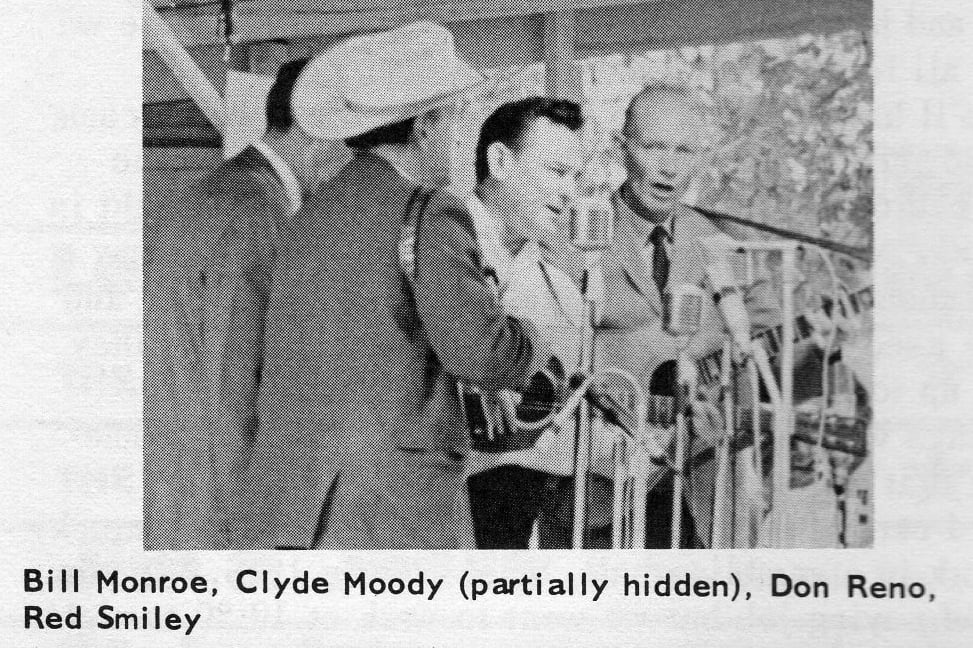
Had you heard of Bill Monroe at this time?
Oh yes, I’d heard of Bill Monroe ever since I was big enough to remember anything, because they worked out of Greenville, S.C. as the Monroe Brothers and I used to listen to them on the radio every morning. Incidentally, Byron Parker, the old hired hand, was working with them at this particular time, this was when I was living in North Carolina before we moved back to South Caroline. WFBC in Greenville was a 5000 watt station and it carried them and I believe they worked on WWNC for a while and then WBT. The Crazy Water Crystal bunch was coming somewhere in there. I faintly remember that, but I do remember Charlie and Bill, The Monroe Brothers.
You mention that you did Mule Skinner Blues in the Contest, was this Bill’s version or Jimmy Rodgers’ version?
It undoubtly had to be Bill’s version ’cause the Rodgers version didn’t stir anybody. Monroe should be given all the credit for making “Mule Skinner Blues” what it ever was. I wasn’t a (Jimmy) Rodgers fan, he was too slow for me. I wanted something that was moving back then. I appreciated him (Rodgers) more when I got older then I did then. I liked groups. We had several groups that were real good. We had Mainers Mountaineers, The Carlisle Brothers, Cliff and Bill, The Callahan Brothers, and The Blue Sky Boys were always two of my favorites.
How about Charlie Poole?
No, I never heard anything about Charlie Poole until 1953 or somewhere in there and someone came around and tried to sell me Charlie Poole’s banjo, I said who is Charlie Poole? I never heard anyone mention Charlie Poole (Western N.C. 8c S.C.). I believe the music was a heritage of that part of the country. I don’t think they tried to copy anybody, they just started playing and what ever turned out to be was the style they developed.
You were working with the Morris Brothers when the war broke out, were you drafted right away?
No, I was only thirteen or fourteen and it was a long time after that I joined the Army to go with my brother who was 16 years older than I was. Bill Monroe wanted me to go to work for him in 1943 and I was going to go with him if the Army hadn’t taken me, but they took me.
Why did he (Bill Monroe) want you to go to work for him? How did he hear about you?
Well Clyde Moody was an old North Carolina boy, he was working with Bill at the time and Chubby Wise just started working him, and Sam and Kirk Mcgee were working on a tent show and Floyd Eckerts was with him too. I was working at WSPA and the Franklin Hotel was just across the street from the radio station. So they came over and did a guest spot on the show. When Clyde (Moody) heard me play banjo, he immediately had to take me over to the hotel to let the other fellows hear me. They kept me playing just about all day over there, they had to save me till Bill got in so he could hear me and when he did, right away he said, “Boy, you want a job?” I told him I would love to have one but I had to wait and see if I was going in the Army or not , and if I didn’t have to go (in the Army) I’d come to work with him, but I went in the Army. I was playing pretty good 5-string at that time, different things.
You were working with Arthur Smith at this time (Arthur Guitar Boogie Smith) was this before the Guitar Boogie?
Yes, this was in 1942—43.
You said Arthur (Smith) was into jazz, did this influence you to try any of this stuff on the banjo?
I guess it was because we did everything in the book music wise, all the top tunes of the twenties, Arthur played fiddle then and his brother Sonny played ‘sock’ rhythm guitar. I worked with him and got into playing open chords on hymns and slow numbers. I played more guitar then than Arthur did. He picked up a guitar once in a while and picked something on it but he didn’t start playing guitar until after the band broke up and I went into the service, Arthur went over to WBT and went to work for the Briarhoppers. Later on he went into the Navy. He started featuring the guitar in Charlotte on WBT.
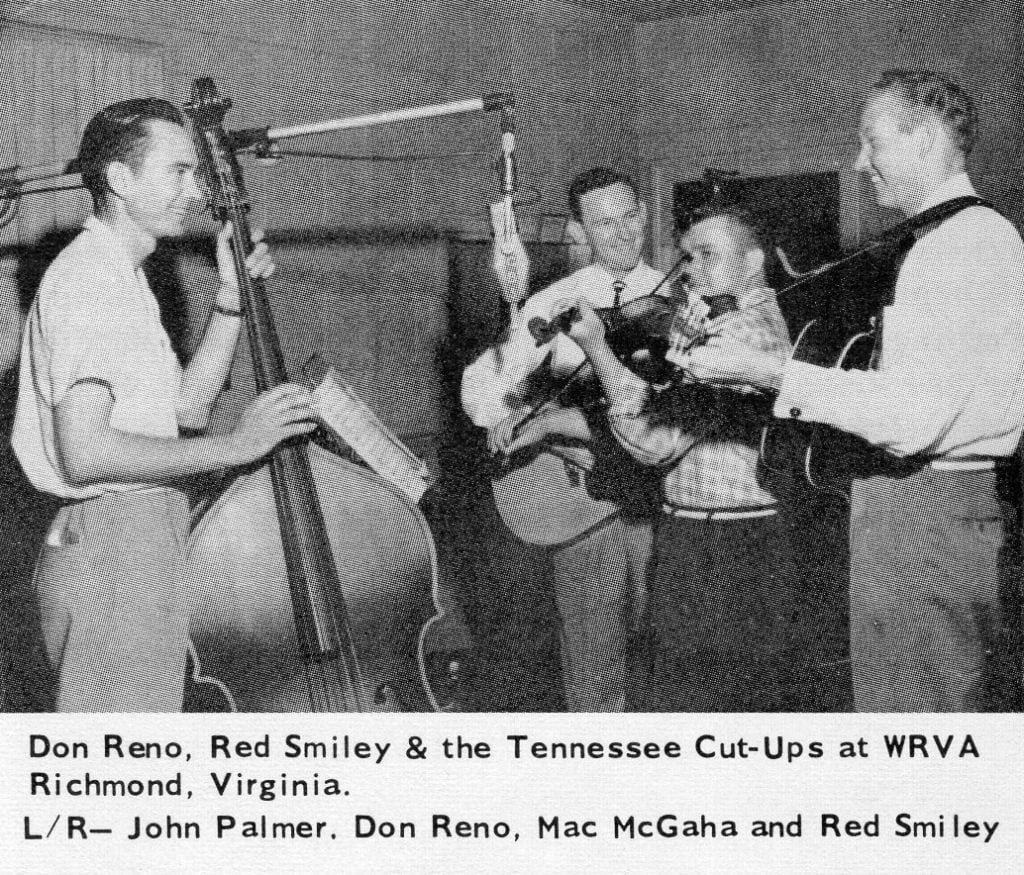
When you say you played more guitar were you playing lead?
Yes, I was playing lead, I was a much better guitar player than a banjo player.
Did you record anything back then?
No, it was the latter part of ’45 or early ’46 we recorded Guitar Boogie and I was playing rhythm guitar on that, he (Arthur Smith) was playing the lead.
He’s playing guitar but it was a flat top guitar, and you playing rhythm, thats and odd turn-around.
We turned around every way back then, I played everything bass, drums whatever needed to be done. We played twin stuff with guitar and twin stuff with fiddles. He taught me to read and write music to the point that he would write out something he wanted me to play and that was what I had to play whether I liked it or not. He’d say, “You play that right there,” if you wanted to get paid, you played that. He was real particular about not adding or taking away.
Did you record the original cut of Guitar Boogie?
Yes.
Who else was on that session?
Roy Lear, bass; Cecil Campbell, of the Tenn. Playboys. It was actually Cecil’s session and we threwthis (Guitar Boogie) in at the end of the session. It was cut accidently.
Had you laid the banjo up?
I started to at that time ’cause I hadn’t seen a banjo at the time. I had shipped it back home it was the one that (Earl) Scruggs has been playing. I got the banjo from Snuffy Jenkins, an old Mastertone and I had fiddle rosin in the banjo case and it must have gotten hot or something and the rosin had melted over it. I opened the case when I got home and took a look at it and shoved it back under the bed.
You said you came out of service and went back into the store, did you know that your replacement with the Morris Bros. had gone to work on the Opry?
Yes, I knew that, I was surprised to find out when I got back, but I was glad that he did, because Earl (Scruggs) played good back then and I thought he played an excellent banjo with Bill (Monroe). The group fit him and made him really sound good.
Did you think of it as a different sound?
No, it sounded a lot like the Morris Brothers. I would say the group at that time, Chubby Wise and Earl and Bill’s mandolin playing made the group real unique. Cedric Rainwater played real good bass and Lester Flatt played good guitar. He (Bill Monroe) had a tight group, the best I ever heard. Bill’s music had a little bit more sting to it than the old Morris Brothers’ music. Of course, the singing was high and back then Bill sang high, he tuned over standard. The music had a real good sock to it
Did you realize that the coverage that Bill was giving would have that impression on the sound?
Yes, I don’t think anyone today realizes what an impact he did have with his music because the Opry officials told him one night that he was turning in more Opry service money than any other artist. He was having overflowing crowds where ever he went. When Bill Monroe was in town the whole town was out. He worked seven days a week.
Did you consciously change your style?
Yes, I figured Earl had got to the spotlight first and if I continued along the same way he did then I was just going to be a carbon copy of Earl Scruggs. I just didn’t see that. I was playing professionally before Earl was in a small market, but it would do no good copying Earl.
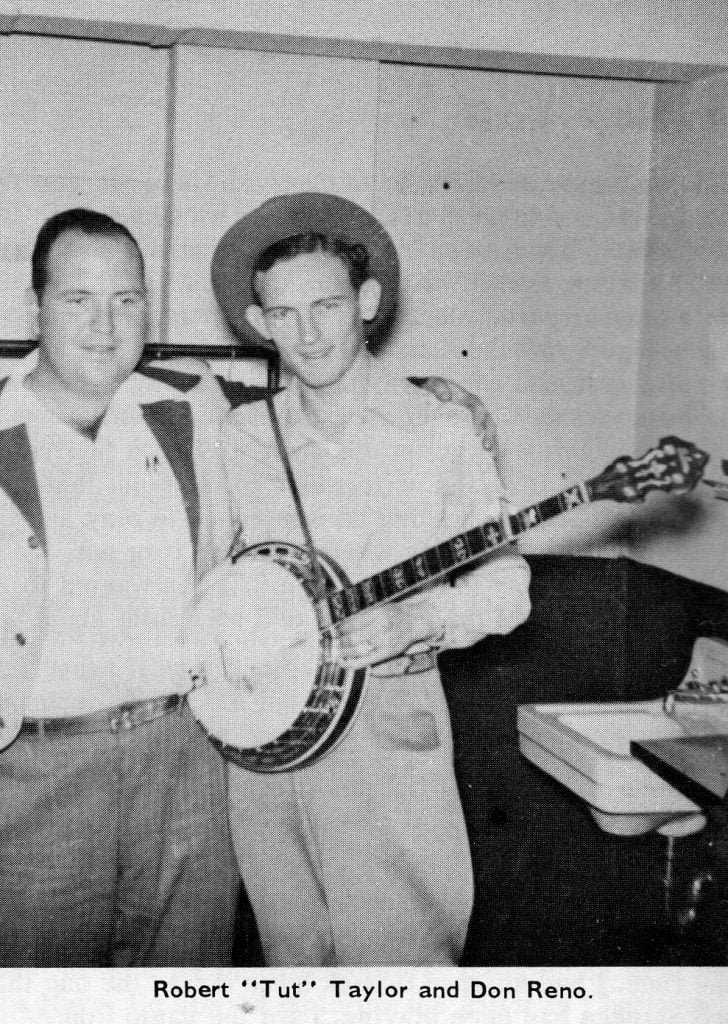
You had to change?
Yes, I saw the banjo was building and I wanted to put it into many different markets and higher brackets than it had been, by doing some of the old pop tunes on the banjo. I’ll explain why. A person that didn’t really follow the music close couldn’t tell the difference between “Cripple Creek”, Sally Goodin” and Sally Johnson”, it all sounded like a running conglomeration to them. If they heard something like “Five Foot Two” or “Lime House Blues”,“Yes Sir, That’s My Baby”, something they had heard an orchestra play, then they would say what is this playing? If you hear a banjo and get the ring of one in your head you’re stuck with it.
You mention Earl, did you know him before you went in (the Army)?
Yes, I knew him from the time I was about twelve years old. He used to come to the radio station when I was with the Morris Brothers, he and Grady Wilky (Sic?) and sit and watch the shows?
Did you know he picked?
Not at first. He was pretty bashful and didn’t say much. The first I knew about his playing was when he wanted to trade his banjo for mine. He had a Sears, Roebuck one then. Of course I wasn’t interested, that’s when I found he played banjo and he played good banjo then. He took my job with the Morris brothers when I left them.
When the war ended you came back, just what did you do?
Well, just before we went into the service my brother and I had bought this grocery store and seven acres of land. He got out before I did and had everything lined up to start operating the store. We started running the grocery store and playing on Saturday nights, for shows, square dances and things like that. But I guess music got too stout for my blood so I decided to just go on back into it. John Palmer and I and Pee Wee Gosdin and Hank Garland, organized a little group. Hank was 14 at that time and was learning guitar real good. I took Hank and we started working twin electrics in ’46, I think we were playing too far over our heads, thats why no one bought it.
When you returned to music after the grocery store where did you go to, did you go with Arthur?
No, I went with Bill.
Bill Monroe?
Yes.
Even though you had conciously changed your style to adapt what really became your style later?
At the time I had given up banjo and was playing guitar. When I heard Scruggs had left Bill, I got my banjo out, straighted it up and started playing. I hadn’t been playing banjo very long when I went with Bill. Of course,
I didn’t tell him that.
Who was in the group at that time?
Benny Martin had just joined him, Joel Price, Jack Phelps and of course Bill.
Who was singing lead?
I had to sing lead when I went to work with him. Jack couldn’t sing lead. I did all the lead work in the quartets.
Did you follow Earl or did you follow Rudy Lyle?
No, Rudy followed me. I played banjo and guitar on all the quartets.
Who played guitar after that?
Mac Wiseman.
When did Jim Eanes play?
He only played about a month, he started about a week or two after I did and Jackie Phelps played steel. Then when Jim left, Jackie Phelps played guitar.
Where did you learn to sing?
I always sang high myself, so learning to sing with Bill was no problem. Bill was very fond of baseball, we used to play baseball and then put on a show.
What position did you play?
I used to play outfield. I wasn’t a very good ball player.
What happened after that?
I played with Bill for 1 1/2 years then came back to Greenville, S.C. and we organized the Tennessee Cut-Ups in 1949. We went to Roanoke with Tommy Magness. He (Tommy) and I had originally contemplated leaving (the Opry) and starting a group together, he was with Roy Acuff. He brought Red Smiley with him and I brought Bill Haney and Verlon Reno with me. We started our first radio show on Dec. 27, 1949, without a rehersal.
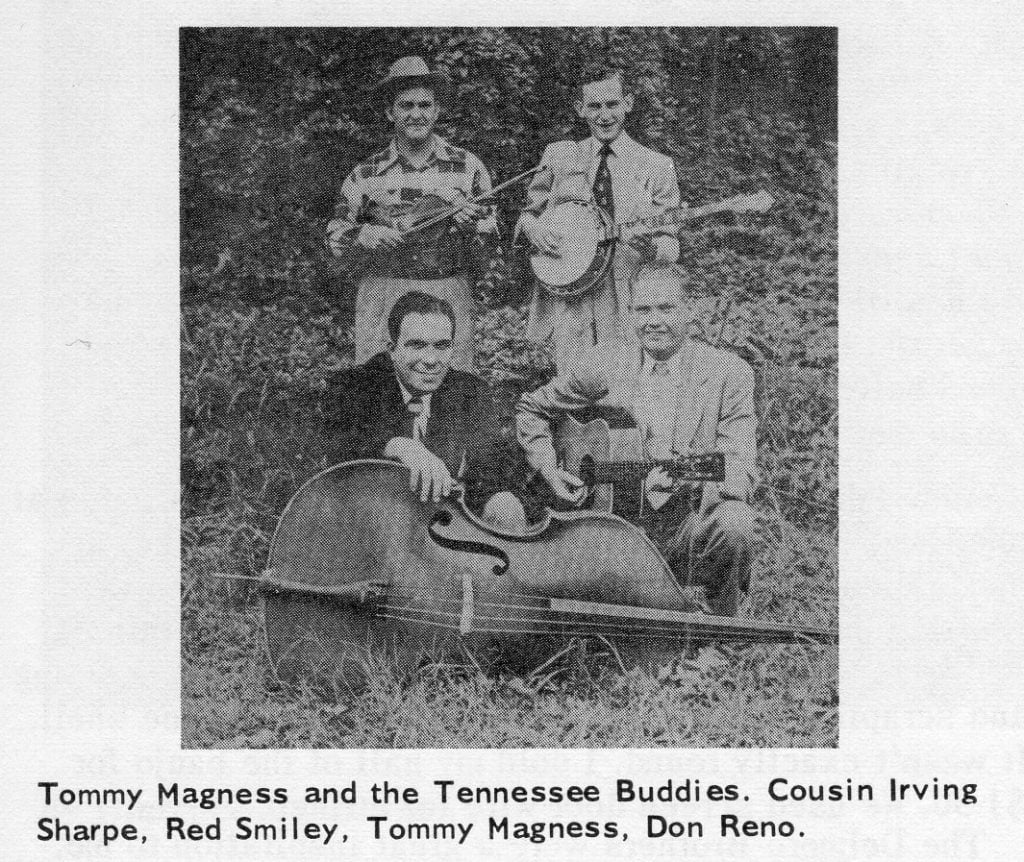
When you started the Tennessee Cut-ups, weren’t they called the Tennessee Buddies?
No, this was what Tommy Magness called his group.
You had the Cut-ups before you went with Tommy?
Yes.
Who was in the group?
Bill Haney, Verlon Reno, John Palmer and Jimmy Pruitt played fiddle and Chuck Haney. (The Haney’s were not related to Carlton).
You went to Roanoke with Tommy, what were you playing? Banjo?
Yes, the first thing I recorded with my name on it was four hymns we recorded with Tommy.
Had you recorded any up to that time other than back up on Arthur Smith’s records?
Yes, I recorded with Jack Guthrie, but I didn’t get any recognition for it.
How did you get to know Jack Guthrie?
He came through Spartenburg, at the State theatre, I had a group called the Carolina Hillbillies, we opened the show and later in the back jamming, I was playing the guitar, I was pretty handy with the box, and he wanted to hire me but I didn’t want to leave the area.
You and Red went with Toby Stroud, what possessed you to make the move?
We were looking for something a little better and Toby had a show on a 50,000 watt radio station, (WWVA, Wheeling, West Va.). He was looking for a group, we felt that in Roanoke we had reached our peak because there wasn’t anything but radio there, I guess you’d say the grass looked greener over there. After Red and I went back to S.C. we organized Don Reno, Red Smiley and the Tennessee Cut-ups and our first recording was “I’m using My Bible for a Road Map”, and 15 others and then we disbanded. We almost starved to death, so I went back with Arthur Smith.
There are some Mac O’dell records on King with a mandolin on them and a very distinctive tenor singer.
I cut four or six sides with them, “Wolf in Sheeps Clothing” was one of them. Mac heard us when we were there recording our own records and asked if we would stay and help him out and I believe the whole group was on that session.
Who was on that first King Reno-Smiley Session?
Jay Haney, bass; Chuck Haney, mandolin; Gopher Addis, fiddle; Red, guitar and I played banjo.
You also played mandolin on that session, if I’m not mistaken?
Yes, I was playing three finger style.
Had you heard Jesse McReynolds at that time?
No, I don’t believe they (Jim & Jesse) were recording at that time and Jesse didn’t do crosspicking before that.
You cut 16 sides for King in Cincinnati in 1952 and then you returned to Arthur Smith? Why did the record company release the records after the group disbanded?
I guess because of the investment. As it turned out “Using My Bible for a Road Map” saved them (Ring) from bankruptcy.
When you returned to Arthur, what did you play?
He featured me on banjo and started doing a lot of TV work around Charlotte. Arthur and I and Tommy (Faile) worked up three guitars, 3-D Boogie was cut using three guitars in harmony. I recorded quite a few numbers with Arthur.
When did you and Red get back together?
1955.
Why?
I started getting offers of $400.00 and $500.00 a day for park shows because people had been hearing the records and wanted to get in touch with us. Red wanted to get back together then so we had something to go on, so we went. It was quite a task turning in a resignation with Smith. He had been so nice to me.
Feudin’ Banjos, who came up with it?
(Arthur) Smith. Red and I kept recording even though I was working with Arthur, Tommy Faille played bass (electric) and Bill Denton CBS correspondent played drums, that was in 1953. Of course, we didn’t make an issue of it. At that time no one paid attention to things like that, you just tried to get a good solid bass.
When you and Red went to WRVA in Richmond who was with you?
Red, Myself, Mac Magaha and John Palmer. We stayed together for ten years.
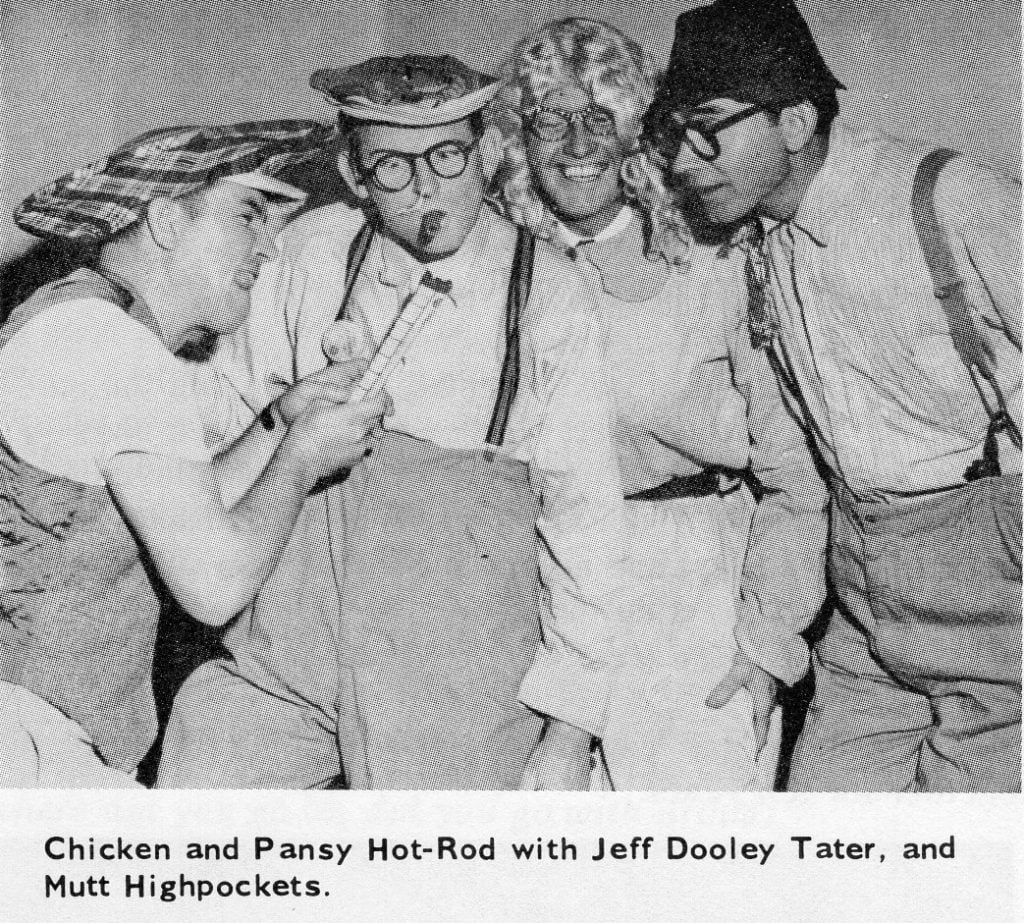
I remember seeing the comedy you did, it was some of the wildest zany comedy I have ever seen. How did this come about?
I’ve done comedy all my life and my brother and I had a ‘Chicken Hotrod’ many years ago. The skits we worked out then were more action and not many words but most people will remember that long after they have forgotten us. We worked in Richmond, recorded for King, then to Wash., D.C. to work for Connie B. Gay, and then back to Richmond. Then we started in Roanoke in Dec. 27, 1956, on a morning TV show. We thought it was the craziest thing we had ever heard of.
Another person that you influenced was Eddie Adcock.
Yes, the first time we heard Eddie he was playing with Jody Rainwater around Crewe, Va. They had a radio program at that time and I used to listen to them, but it sounded like the banjo player was struggling, I could hear the picks scraping the strings, so I went over to see them one day and found out why. His bridge was very high. His picks were bent and the strings were terrible. I fixed the bridge for him and gave him a new set of strings and picks. Somehow I was intrigued with him, I knew he would be a good banjo player someday. Later that year he came and stayed at the same trailer park where I lived and we got together quite a bit.
Where did you get your banjo?
From Earl. It was the one I had when I was young. We had traded years ago.
What do you feel about the state of the art?
I feel the festivals are bringing the people together. The artists have a chance to visit with the fans and the fans have a chance to visit with each other. It’s kinda like the old camp meetings, bringing the people back to earth.
Ronnie is now playing guitar for the Osborne Brothers, are any of your other children interested in music?
No, not yet. I think he’s doing a good job with the Osbornes and if thats the life he wants, I’m for it.
When you and Red decided to part company what happened?
All I would like to add to Red’s comments would be to say we never had a cross word.
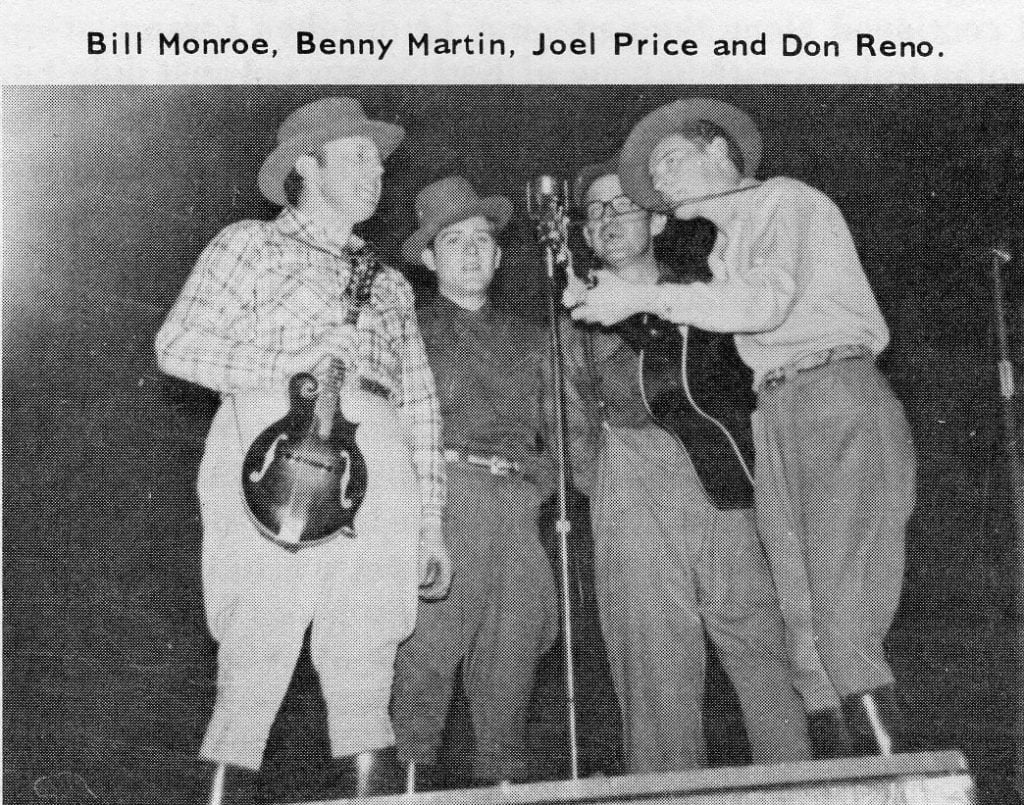
You worked with Benny Martin for awhile.
Yes, then Ronnie and I went as a single. Then I went with Bill Harrell. I called from Indiana and Bill said he was ready to go anytime, so I moved up here and now Red has gotten the urge again so he’s back with us and we’re all tickled about that.
You were a very prolific song writer at one time but don’t seem to be writing much any more why?
I’m still writing, I can’t just sit and write, I may have to get out of bed and write, but when I do start I sometimes write as many as 15 songs before I stop.
Who were your inspirations other than Snuffy Jenkins?
Wade (Mainer) I imagine. A friend and I made a banjo at one time. We couldn’t get enough money to buy one, and daddy didn’t want me to be a musician anyway, so we whittled one out of wood, and killed an old mountain cat and kept soaking his hide in ashes and water and scraping and scraping, till we got it bolted down across the shell. It wasn’t exactly round. I sold my half of the banjo for $1.50. We used screen door wire for strings.
The Delmore Brothers were a great inspiration to me, Tommy Magness stayed with my brother when I was a little boy and he would make me play rhythm guitar behind the hoe-downs and it had to be right, and the Blue Sky Boys as far as singing was concerned.
Share this article
2 Comments
Leave a Comment Cancel Reply
This site uses Akismet to reduce spam. Learn how your comment data is processed.
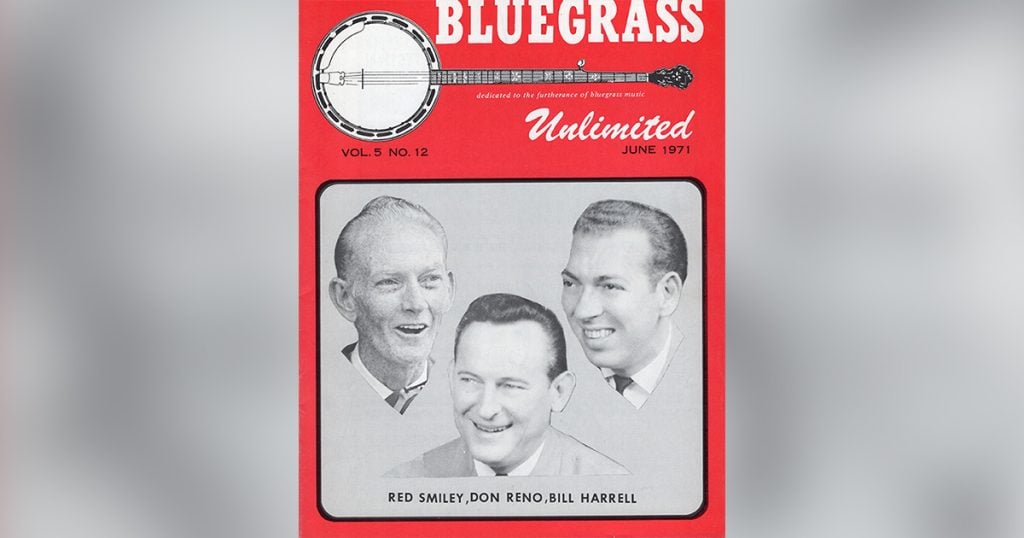
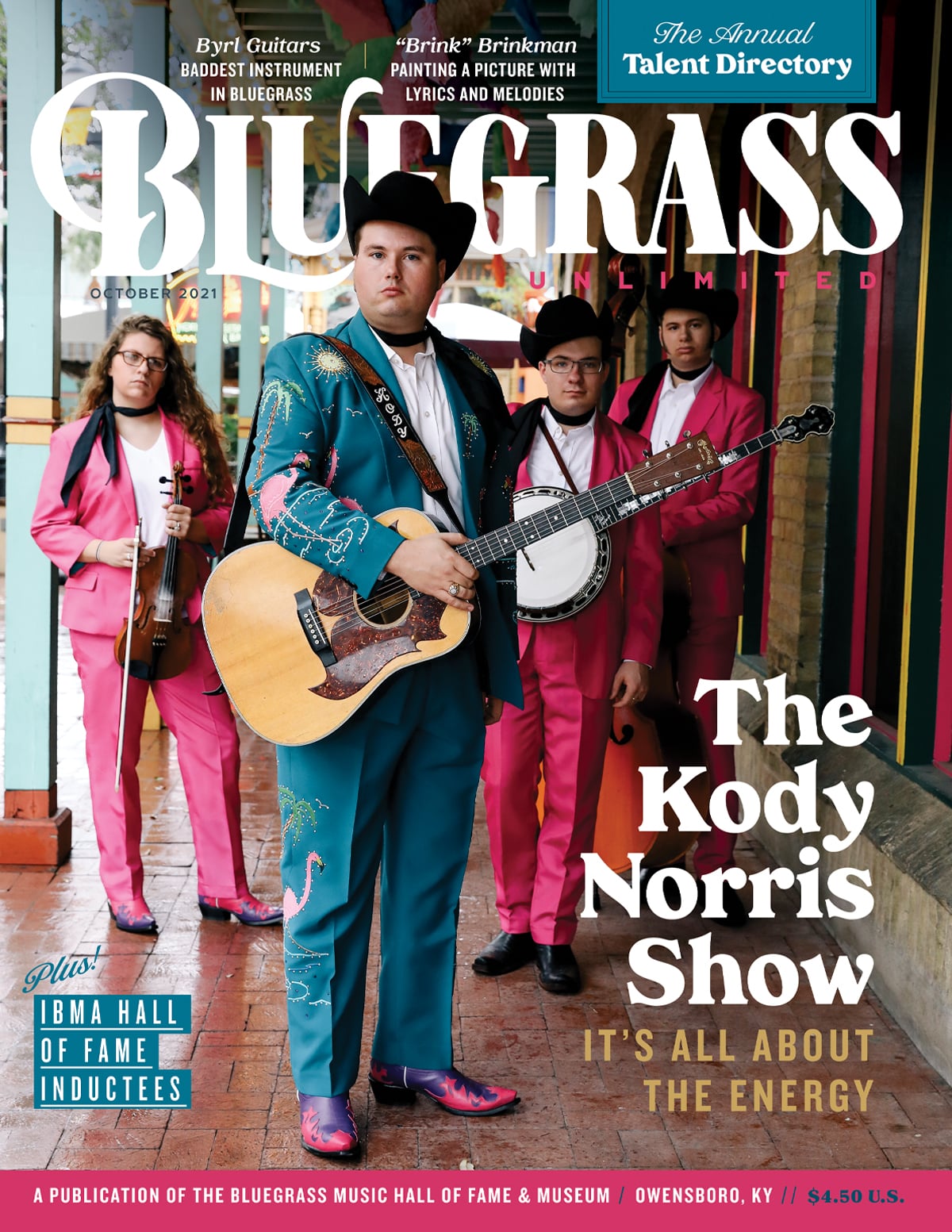
My name is Don Smiley also born in Asheville NC. It’s always great to read about family an being related to Red Smiley makes it greater. It’s a sad time we live in when we forget the pioneers of Bluegrass music. We need a comeback of Bluegrass.
I had the wonderful life of being able to attend Bluegrass festivals in Virginia. My dad Nelson Waibel was a good friend to Red Smiley. We would have people over our house. Playing bluegrass music. Red Smiley always called himself our star boarder. Had the Goins Brothers, Red Smiley, Don Reno, Bill Harrell playing music in our basement. I remember the first issue of Bluegrass Unlimited. Whenever the magazine would come out , I would read from cover to cover. Thanks for all the good memories